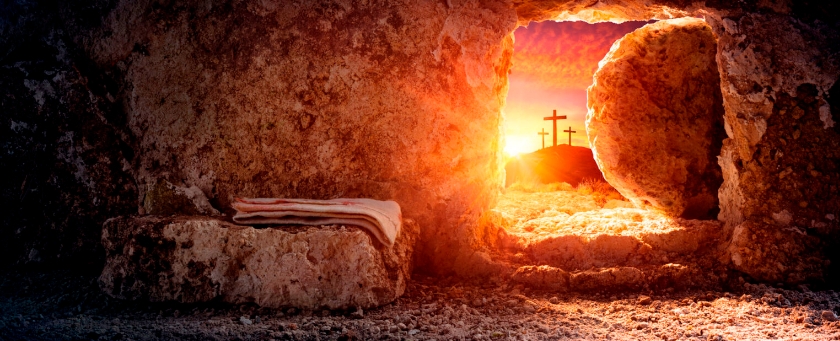Jesus, the Source of Eternal Salvation
Easter Sunday The Resurrection of the Lord, Year C

Readings:
Acts 10:34a, 37-43; Ps. 118; Col. 3:1-4; Jn. 20:1-9
(Audio recorded live, 17 April 2022)
For they did not yet understand the Scripture that he had to rise from the dead. Yet, He is risen, alleluia, alleluia, truly He is risen, alleluia, alleluia! The scripture passage referenced in today’s gospel is that of Psalm 16: “For you will not abandon my soul to Sheol, nor let your devout one see the pit.” And as the author to the letter to the Hebrews says: “In the days when he was in the flesh, he offered prayers and supplications with loud cries and tears to God, who was able to save him from death, and he was heard because of his reverence. Son though he was, he learned obedience from what he suffered; and when perfected, he became the source of eternal salvation for all who obey him” (Heb. 5:7-9). And so, this Easter Sunday, we celebrate the single most significant event in the life of the Church, the Resurrection of our Blessed Lord. Through his obedience to the will of the Father, he has overcome the sting of death and given rise to a new hope in the life of the world to come.
St. Peter’s speech describes how he and the apostles witnessed Jesus going about doing good throughout Judea, healing all oppressed by the devil; how Jesus was put to death by crucifixion; and how God raised him on the third day. He appeared to his chosen witnesses, eating and drinking with them, and commissioned them to preach to the people that Jesus is the one chosen by God to be judge of the living and the dead. And that all who believe in him will receive forgiveness of sins through his name. Today, throughout the entire Christian world, believers are all focused on Jesus and the great mystery of our faith.
St. Paul reminds us that through our baptism we have all been raised with Christ. We are already experiencing new life, especially when we celebrate the sacraments. Therefore, we ought to allow the sacraments to direct our hearts and minds to what is above, not what is on earth. So often we are tempted to focus all our energies on worldly things. But, we ought not pass over the way in which God uses the things of this world to communicate himself to us. The waters of life that are sprinkled remind us of our baptism, the Paschal candle reminds us of the Light of Christ, and the Eucharist is a foretaste of the heavenly banquet we are all called to enjoy. What other signs does God use to communicate his presence in your life? We ought to focus on these things as often as we can, because when we do, it is difficult not to notice God in everything we do.
We see an example of how Mary Magdala and Peter are unable to see Jesus after the Resurrection. Mary says, “They have taken the Lord from the tomb, and we don’t know where they put him.” Peter enters the tomb and finds the cloth that covered Jesus’ head and the burial clothes rolled up. They do not see Jesus with their eyes, but all the signs of his resurrection are there. If someone is going to steal a body, why would they roll up the burial clothes and deliberately leave the head cloth folded?
There is an interesting story about the head cloth. A servant, after having prepared the dining table for his master, would stand off to the side and remain attentive until the master had finished the meal. When the master had finished the meal, he would leave his “napkin” crumbled up on the table indicating, “I am finished.” If, however, the master left the table with the intention of returning, he would crease the napkin into folds and leave it beside his dishes. This was a silent communication that, “I am returning.” Now, consider the meaning of the head cloth folded in the tomb. While Mary and Peter do not know what to make of this, the other disciple, the one who arrived at the tomb first, saw and believed. He understood what the master was communicating by this subtle gesture of folding his head covering: “I will return.”
He is risen, alleluia, alleluia, truly, He is risen! He has returned and he remains with us in Word and Sacrament, for he says, “Behold, I am with you always, until the end of the age” (Matt. 28:20). This Easter, may we recognize him all the more, active in our lives, shouldering our burdens, giving us his consolation, filling us with life. And may the communion we share, help us to remain in him as he abides in us. I want to wish everyone a most blessed Easter, for He is risen, alleluia, alleluia, truly He is risen.





Share this post
Twitter
Facebook
Pinterest
Email